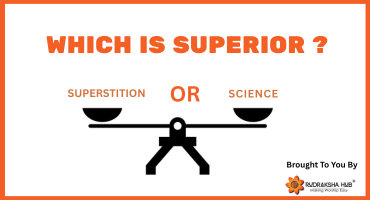
Superstition v. Science
We are in the 21st century, where science has evolved immensely and has even unlocked the secrets of various mysteries like that of space and time, but still, superstitions are also very evidently present in our daily lives. Humans have always been very curious about truth, knowledge, and explanations.
There are two prominent ways in which we can make sense of how things happen and the reasoning behind them: superstition and science. But these two are very different and poles apart, yet at various instances we can observe that our superstitions and scientific facts complement each other and are the two sides of the same coin unaware of their interdependence.
What is superstition?
Superstitions are beliefs that are irrational and self-imposed. These beliefs are imaginary and arise because of the fear of the unknown, and people engage in superstitions because they provide a sense of control in uncertain situations, and people tend to stick to rituals that give them a false sense of control.
It is an age-old phenomenon and exists irrespective of religion. Our ancestors relied on superstitions to understand various areas like diseases, eclipses, and all other day-to-day things.
Superstitions are deeply rooted in our culture, society, and daily life. From avoiding cutting nails at night to considering crows as messengers of our ancestors, these beliefs have been passed down for generations. But apart from passing down by ancestors, people believe in superstitions for various other reasons also like:
Fear of Unknown
For centuries, people in India have followed certain customs and practices and these things got repeated so often that they have become normal now, even though they don’t make any logical sense. For instance, our elders tell us not to leave the house during an eclipse because it is considered as “bad luck” or our mother refuses us to sweep the floor at night, saying that it will “drive away wealth”.
We fear to break these beliefs because they feel more personal as it is how we were raised and taught. These ideas get wired into our brains like reflexes. Even if we later learn they are not true, the emotional connection and memory stay.
Our brain hates uncertainty, so even if a superstition seems silly, a small voice whispers in our head, “But what if ignoring it does bring bad luck?” So it is very clear that our fear keeps superstitions alive more than faith, and we start to see them as choices and not rules.
Cultural Influence
Another reason for believing in superstition would be culture because in India these beliefs are not just habits but a part of who we really are. They shape our festivals, family rituals, and even to some extent our daily routines. And since superstitions are so deeply woven into our life we cannot let go of them because letting go of them can feel like we are giving away a piece of our identity.
Culture always makes these beliefs stronger, and when something has been done the same way for generations, it kind of becomes normal, although it is not relevant in the present time.
For example, our elders always advise us not to travel on certain days like the days of Amavasya because, according to astrology, it is not safe, and this has been followed since ages. So now even with all the facilities and world class travelling services we do hesitate while travelling on these kinds of days.
Therefore, it is very important for us to understand that culture is like an old family recipe where some ingredients might no longer make sense but the dish is still precious and we should not throw it all away but just do the changes according to the needs of the modern world.
What is Science?
Contrary to superstition, science is believed to be something that is more realistic and follows a methodical approach to understanding, observing, and explaining how things work through evidence.
Science is like a detective who is trying to solve the mysteries of the universe, but it does not guess or believe in stories being told, but instead, it tests, observes and proves things step by step. Science is all about asking “Why” and getting the answers for better clarity.
It has been believed by our ancestors and passed on as well that black cats carry bad luck and bad omens. But science proves that these beliefs are baseless because a cat’s fur colour is a genetic element and is not supernatural. Various studies also reveal that black cats are just as friendly and harmless as any other coloured cat.
Science is not against tradition or culture; it just helps us understand the reality and keep up with what’s real and let go of our unrealistic fears. It also helps us to get rid of a number of myths related to diseases, disasters and our life and by doing that we can lead a much better life where we are not feared by unimaginable things.
Although science and superstition are very contrary to each other and in today’s modern time we do favor science but superstition still plays a significant role in many cultures.
Athletes wear lucky socks, businessmen avoid making important deals on certain days, and some people knock on wood to prevent bad luck. So, we can say that even in the modern world, superstition continues to coexist with science.
Science completes superstitions in the same way as reasons complete assumptions. For example:
Menstruating women are considered impure and dirty
In many parts of India, menstruation has historically been associated with impurity, and this has led to various restrictions, such as women not being allowed to enter kitchens, temples, and other sacred places when they are menstruating.
But there are various scientific and logical reasons also behind this superstition as women experience physical fatigue due to blood loss during menstruation, and these restrictions will give them some time to rest and regain their energy.
Additionally, it is also said that idols in temples maintain a delicate energy balance, and since menstruating women emit very high body heat, it would disrupt the equilibrium set in the temple, which would potentially bring cracks in the stone statues of God in the temples.
Ghosts reside in peepal trees
People in India believe that peepal trees are the residence of ghosts, and we should not sleep under them during the night. This myth is very prevalent even today. However, there is a very strong scientific reason as to why we should not sleep under a peepal tree at night:
Trees use carbon dioxide during the day and release oxygen, but at night, it is the other way around. So, when we sleep under the tree, the excess carbon dioxide level can make us feel heavy and suffocate, which is associated with the feeling of being possessed by spirits.
Therefore, last but not least, superstition and science are truly a battle between belief and reason. While superstition appeals to emotions and traditions, science is very much grounded in logic and evidence.
Although both are very much different from each other and more advances in science can debunk various false nuances of our belief system but then also superstitions can never completely disappear. So, the key is to make a balance between embracing cultural traditions and also focusing and acknowledging evidence-based knowledge.
Which Is Superior: Superstition or Science?
There was a very powerful question once asked: Does superstition paves way for science or is science making its path to normalcy using superstition?
To think objectively, there can be both ways to answer this question and still, there would be no one correct answer. The reason is not because there is an ufair advantage to something but because of the wide acceptance.
For the longest time, people believed that God can only be worshipped with incense sticks and Dhoop and Agar. But then it was discovered that good smell keeps the person’s mind happy, make them think differently and also kill the insects and bad bacteria that could hamper health. So, did science pave the way for superstition or the other way round?
When people did not want to use the incense sticks, it was spread as a way to make God happy, and suddenly people started buying it, without knowing that their hygiene was improving. So to make space for science to work, superstition was enforced.
Now let’s go the other way. We all have gone through a phase where we have been told not to say out the achievements too loud so as to not jinx it. The idea was simple. If you talk too much about your happiness, then there is at least one person out there who is not happy due to their life issues.
But now this person will start hating you for your happiness and without you knowing, and sometimes even them knowing, there is a sense of negativity in them for you and maybe in you also for them. This bitterness will be uncalled for and might escalate when least expected.
Due to this, people were told, it will get negative eyes, evil omens, and jinxed due to which something wrong or bad will happen. Now, this person who used to overshare might think of how something went bad, which would have maybe otherwise also gone bad, and now, this person stops sharing for their own good.
Suddenly, the anxiety in this person to know how many people are happy with his happiness and sad with his happiness turns into a genuine desire to see the sadness and try to solve it first rather than flaunting their happiness in their faces.
What just happened here? A scientific fact of not trying to make unnecessary enemies was accepted when superstition was made to accompany a basic term or etiquette. This was science made space for superstition so that the ultimate person stays in proper form with no harm, no foul done.
Conclusion
The entire row over superstition vs science is a melodrama that was never wanted, respected, and adored by the people, as it was unwanted. Rather than focusing on which one is better, it is important to know which one will save the preachings of ethics, culture, law, and routine without being obnoxious about the same.
This article is a genuine presentation of our beliefs as a religion-first organization because we do not disagree with the preachings of science. We just like to highlight a different aspect of people’s beliefs, thought processes, and aid.
If you would like to add anything to this, comment about this, talk about this in general and want us to edit this in any style, just connect with us at wa.me/918542929702 or info@rudrakshahub.com and we shall be happy to help you.
Until then, keep smiling and continue worshipping with Rudraksha Hub!
Written by:
Nikita
Writer (Content/ Creative)
Rudraksha Hub













